Transformative Learning in Action: Teachers Conference 2025 (Bagmati Province)
- Start Date:
- July 19, 2025, 8 a.m.
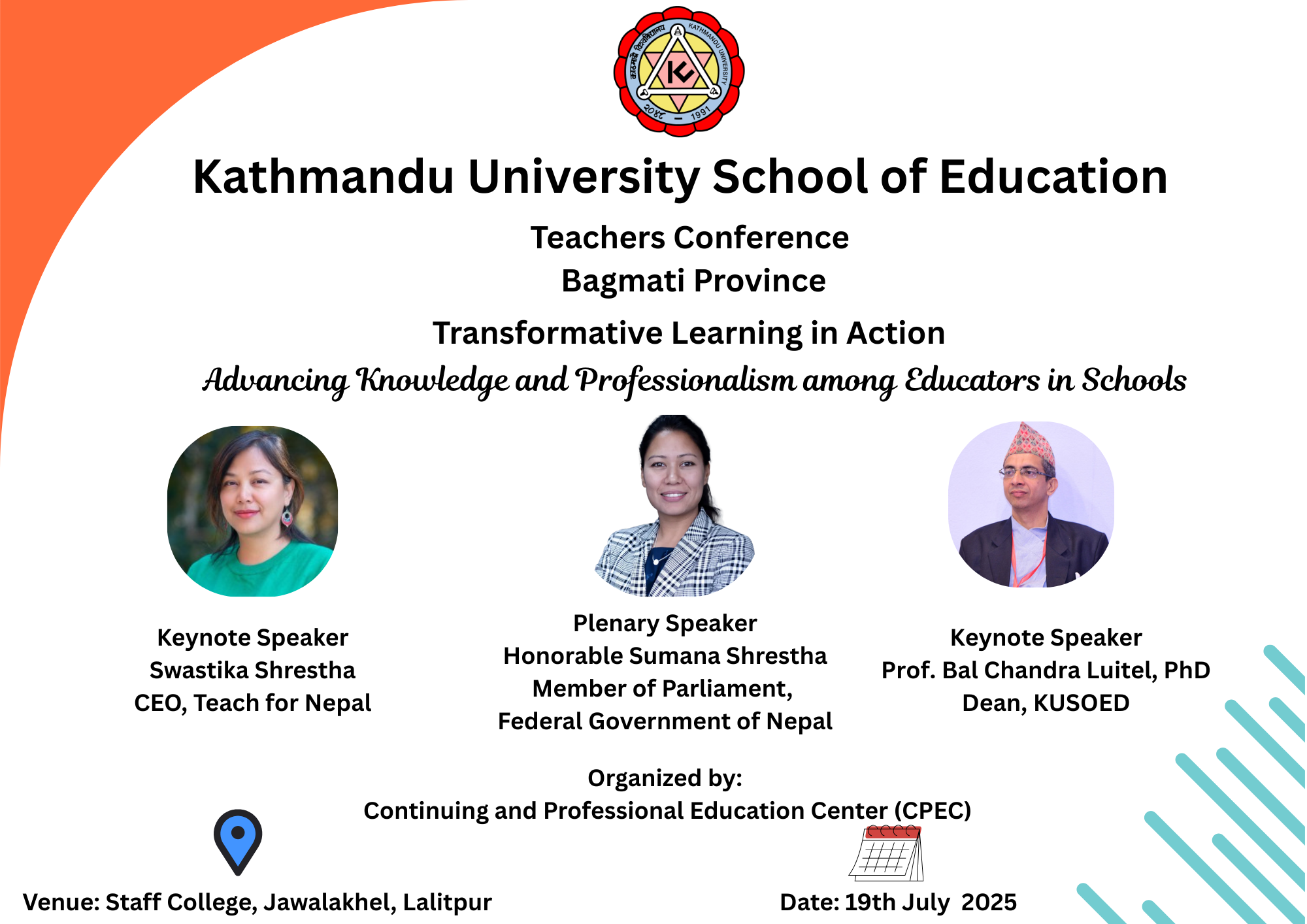
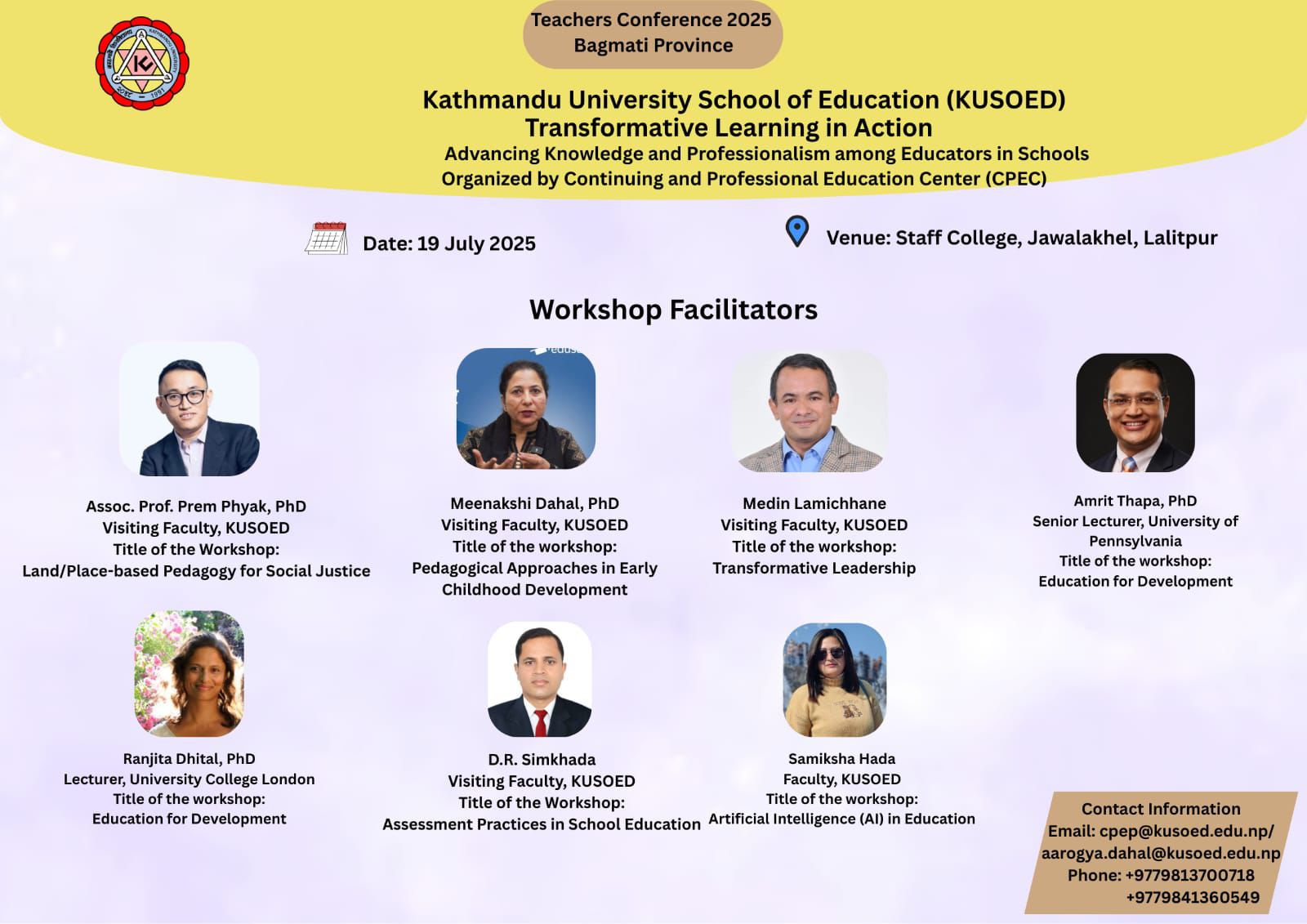
About the Conference
The “Transformative Learning in Action” conference brings together educators, researchers, and school leaders to explore innovative practices that enhance knowledge and professionalism in teaching. This event offers a space for sharing strategies, reflecting on classroom practices, and building networks for long-term growth.
Under the theme “Transformative Learning in Action,” the conference provides a platform for sharing innovative teaching strategies, engaging in critical dialogue, and advancing professional learning in Nepal’s education system.
This one-day event will feature:
- Keynote speeches
- Paper presentations
- Workshops
- Panel discussions
All the sessions will center on promoting reflective and transformative educational practices in schools and beyond.
Conference Objective
- Promote professional growth and learning among teachers and school leaders.
- Encourage innovative, context-sensitive teaching practices.
- Share best practices across schools and disciplines.
- Facilitate reflective dialogue among educators.
- Strengthen academic and professional network across institutions.
Themes
Main theme: Transformative Learning in Action
Sub themes
- Reflective Teaching and Professional Identity
- Innovative and Context-Sensitive Pedagogies
- Education for Equity and Inclusion
- Teacher Leadership and Collaboration
- Classroom-Based and Research and Action Research
- Curriculum Reform and Assessment Practices
Date and venue
Date: 19th July, 2025
Venue: Staff College, Jawalakhel, Lalitpur
Registration Time: 7:30 AM - 8:30 AM
Program Time: 8:30 AM - 5:10 PM
Call for Presentation
We invite educators, researchers, and practitioners to present at the conference.
Submit your abstract to cpep@kusoed.edu.np or complete the Google form to participate by following the registration link in the registration section below.
Submission requirement:
- Title of presentation
- Abstract or summary (max 250 words)
- Name, affiliation, and contact info
Registration
Register Here: https://forms.gle/mNWnDziebdLHgFCp6
Deadline: 17th July 2025.
Registration Charge: NRs. 2000 per participant
Who should attend?
- School Teachers
- Students
- Educational Leaders
- Teacher Educators
- Researchers
- Curriculum Developers
Why should you attend?
- Engage in meaningful educational discussions
- Discover and share the best teaching practices
- Gain insights for professional development
- Network with peers from across Nepal
Keynote Speakers:
Prof. Bal Chandra Luitel, PhD
Dean, Kathmandu University School of Education
I completed my M.Ed. (1997) from TU, followed by a Postgraduate Diploma (2002), MSc (2003), and Ph.D. in Mathematics Education (2009) from Curtin University.
My service at KU began in 1998, initially as a Lecturer, followed by Assistant Professor in 2005, Associate Professor in 2012, and Professor in 2018. I have served in various administrative roles, including Coordinator of Research and Publication, Coordinator of Master's Programs, and Associate Dean. Additionally, I have served as a Senate Member (Teacher Representative) for approximately three years. Currently, I am the Dean of the School of Education.
Swostika Shrestha
CEO, Teach for Nepal
Swostika Shrestha is the Co-founder and CEO at Teach For Nepal, a movement of outstanding university graduates and young professionals who are committed to ending education inequity in Nepal, starting with a two-year teaching fellowship in public schools.
She has a Bachelor's in Psychology from Olivet College in Michigan and a Master's Degree in Public Affairs with a concentration in International Development from Cornell University.
Before co-founding Teach For Nepal, Swastika facilitated youth leadership, life-skill development, service learning, and experiential learning projects for more than 12 years.
She has also worked as a civil affairs officer in UNMIN and as a development consultant for various organizations.
Plenary Speaker:
Sumana Shrestha
Member of the Parliament, Federal Government of Nepal
Sumana Shrestha is a Nepalese politician and former Minister of Education, Science and Technology, who has made significant contributions to both politics and entrepreneurship. She completed her A-Levels at Budhanilkantha School and earned a Bachelor of Arts degree in Economics and Mathematics from Bryn Mawr College and Haverford College, respectively, graduating magna cum laude. She further pursued a Master of Business Administration (MBA) from the Massachusetts Institute of Technology (MIT) Sloan School of Management. Before entering politics, she worked as a management consultant, entrepreneur, and philanthropist, founding initiatives like Carpool Kathmandu and Medication for Nepal, which gained international recognition. She entered politics in 2022 as a member of the Federal Parliament, representing the Rastriya Swatantra Party, and was appointed Minister of Education, Science, and Technology in March 2024. Throughout her career, she has advocated for evidence-based policymaking, education reform, and good governance, while also promoting the involvement of the public in the legislative process.
Personalities in the Panel Discussions:
Hon. Bidhya Bhattarai
Member of Parliament, Federal Government
Bidya Bhattarai is a Nepali politician and the past Minister of Education, Science, and Technology of Nepal. Since 2019, she has been a member of the House of Representatives of the Federal Parliament of Nepal.
Prof. Bal Chandra Luitel, PhD
Dean, Kathmandu University School of Education
I completed my M.Ed. (1997) from TU, followed by a Postgraduate Diploma (2002), M.Sc. (2003), and Ph.D. in Mathematics Education (2009) from Curtin University.
My service at KU began in 1998, initially as a Lecturer, followed by Assistant Professor in 2005, Associate Professor in 2012, and Professor in 2018. I have served in various administrative roles, including Coordinator of Research and Publication, Coordinator of Master's Programs, and Associate Dean. Additionally, I have served as a Senate Member (Teacher Representative) for approximately three years. Currently, I am the Dean of the School of Education.
Mahashram Sharma, PhD
Chairperson, National Examination Board
Dr. Mahashram Sharma is an educator and administrator from Nepal who was appointed as the chairman of the National Examination Board (NEB) in 2024. He was selected for the role on the recommendation of the Public Service Commission, following a formal interview process conducted in December 2023. Dr. Sharma, who is 64 years old, has a long-standing career in education and civil service in Nepal. He began his teaching career in 2033 BS (1976 AD) and later transitioned into civil service in 2042 BS (1985 AD), eventually becoming the Secretary to the Government of Nepal in 2072 BS (2015 AD). He also served as the chairperson of the Citizens' Investment Fund in 2074 BS (2017 AD).
Krishna Prasad Adhikari
President, PABSON
Krishna Prasad Adhikari was elected as the president of the Private and Boarding School Organisation of Nepal (PABSON) at its 16th National General Convention held in Praya Pratishan, Kamaladi, Kathmandu. Prior to this, Mr. Adhikari was engaged there as Vice President of PABSON. He emphasized his commitment to enhancing quality education in PABSON-affiliated schools and highlighted the need to address the recently introduced Education Bill.
He also outlined his plan to play a role in including school issues in the School Education Act. Mr. Krishna Prasad Adhikari is also the founder and principal of Valley Public School.
Mahendra Thapa, PhD
Visiting Faculty, KUSOED
Moderator
With a specialized degree in training and development, Mahendra Thapa has been actively engaged in the professional development of teachers, with a strong focus on enhancing communication skills, effective classroom management, and educator wellbeing. With a passion for empowering educators, Mahendra combines his scientific background with practical training expertise to create impactful learning experiences that support both personal and professional growth in the education sector.
Bio of Workshop Facilitators:
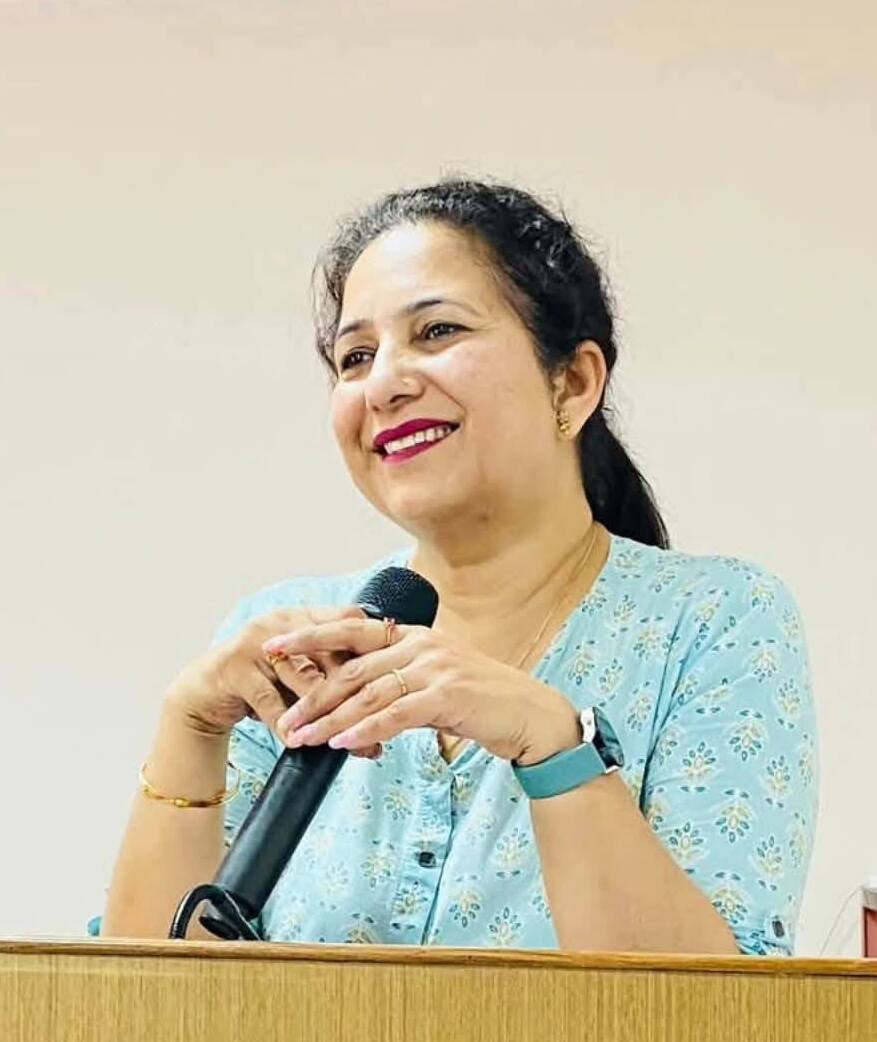
Meenakshi Dahal, PhD
Early Childhood Development and Education Expert
Visiting Faculty, KUSOED
Title of the Workshop: Pedagogical Approaches in Early Childhood Development
With over 20 years of diverse experience in the education sector, I have worked extensively across governmental, non-governmental, and donor systems—from grassroots initiatives to national-level programs. My work has consistently focused on promoting children's rights to quality basic education and ensuring their holistic development.
I have led and contributed to numerous programs aimed at enhancing early childhood care and development (ECCD), with a strong emphasis on inclusive education, particularly increasing enrollment among girls and socio-culturally marginalized groups. My expertise includes designing educational policies, strategies, guidelines, training packages, and resource materials that support quality learning environments.
Fluent in cross-sector communication and experienced in multicultural settings, I have provided technical support and research leadership on ECCD and broader educational practices. I also bring strong experience in organizational development and have contributed to building institutional capacities in various educational organizations. In addition to ECCD, I am actively engaged in research and training in areas such as community leadership, women's empowerment, strategic planning, results-based monitoring and evaluation (RBM), and project cycle management (PCM). My work is grounded in a commitment to equity, participation, and sustainable educational outcomes.
Prem Phyak, PhD
Associate Professor, KUSOED
Title of the Workshop: Place-based pedagogy
My research area broadly covers the intersection of language, society, and education. My specific research interests include language education policy, multilingual education/literacies/pedagogies, translanguaging, critical applied linguistics/sociolinguistics/TESOL, decoloniality and Indigenous education, social justice/equity, community engagement/agency/advocacy/activism, and teacher education. I focus on how global ideologies (e.g., neoliberalism and development) shape the creation and implementation of local educational policies, plans, and practices, and examine their role in social justice and equity. My theoretical perspectives are informed largely by decoloniality, anthropology/ethnography of policy, critical applied linguistics, and transformative learning to explore the ideologies shaping the creation, interpretation, and implementation of policies, curricula and pedagogies and unpack how they affect multilingualism, epistemic diversities, identities and learning of Indigenous youth and minoritized language speakers. I adopt participatory, social semiotic, engaged ethnographic and Indigenous methodological approaches to work with the communities of Indigenous people (parents, youth and activists), teachers/teacher educators, policymakers and non-government organizations to create education policies and pedagogies that recognize the languages, literacies, epistemologies, stories, histories, cultures, and places of Indigenous/racialized and minoritized language speakers as transformative resources for building equitable educational spaces. As an Indigenous Yaakthung, teacher educator, and critical applied linguist, I embrace educational research as a collaborative and transformative tool to build critical awareness, agency, advocacy, and activism of the communities of teachers, youth, parents, and the public for equitable educational policies, plans, and practices. I supervise and mentor students and provide consultancy services in the following areas:
- Language policy, multilingual education, and multiliteracies
- Local-global interface in educational policies/plans, development ideology, and social semiotics of school space
- Indigenous language education, epistemologies, and decolonial praxis
- Social justice, transformative learning, and school-community engagement
- Teacher education, teacher research, and teacher mentoring
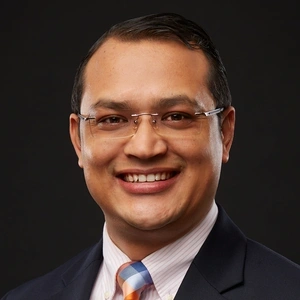
Amrit Thapa, PhD
Senior Lecturer, University of Pennsylvania
Title of the Workshop: Education for Development
Amrit Thapa is a senior lecturer in the International Educational Development Program and an instructor in the Education Entrepreneurship program at Penn GSE. He also serves as a lecturer in the Department of Sociology in the School of Arts and Sciences. He received his bachelor’s and master’s degrees in economics from Sri Sathya Sai Institute of Higher Learning, India, and M.Phil. and Ph.D. in economics and education from Columbia University. Dr. Thapa is also a research affiliate at Penn’s Population Studies Center, a Fulbright specialist, an affiliated researcher for the Center for Benefit–Cost Studies of Education at Penn GSE, a consultant to the UNESCO Institute of Statistics, and an advisory board member of the International Journal of Educational Development. In 2019, Dr. Thapa was honored with the prestigious Penn GSE Excellence in Teaching Award.
Before Penn GSE, Dr. Thapa worked as a research director at the National School Climate Center (NSCC), an educational non-profit organization, where he was involved in several school climate-related projects such as development and validity/reliability studies of school climate/SEL metrics, comparative study of schools with and without social inclusion programs in collaboration with Special Olympics International, and studying the lives of students with learning disabilities over time. Dr. Thapa has also served as vice president and representative to the United Nations for the Institute of Global Education (IGE), an NGO that has consultative status with the Economic & Social Council of the United Nations. He was involved as a researcher for the Schott Foundation for Public Education and was a teaching fellow for the Program in Economic Policy Management (PEPM) at the School of International & Public Affairs at Columbia University. Dr. Thapa has also taught graduate-level economics of education courses at the Teachers College, Columbia University, and undergraduate-level economics courses at Queens College, City University of New York, and Kathmandu University, Nepal. Dr. Thapa finds fulfillment in community service activities, enjoys poetry and music, and loves to travel and spend time outdoors with Mother Nature.
Ranjita Dhital, PhD
Lecturer in Interdisciplinary Health Studies, University College London
Title of the Workshop: Education for Development
Dr Ranjita Dhital is a Lecturer in Interdisciplinary Health Studies at the Arts and Sciences Department (UASc) at University College London, a public health researcher, pharmacist and a sculptor. She has practised as an addiction specialist pharmacist, a community pharmacist and worked in public health.
Her public health research is applying creative and participatory approaches to reduce alcohol harm and promote mental well-being. She is the Research Director and the Graduate Research Tutor for the Arts and Sciences Department (UASc) at UCL.
She founded and is Director of the “International Arts in Pharmacy Group” and “Creative Health Nepal: Arts-Health Community” and co-leads the “Neurodiversity In/And Creative Research Network”.
Medin Lamichhane
Principal, Ullens School
Title of the Workshop: Transformative Leadership
Mr. Medin Lamichhane has been the Principal of Ullens School since its inception, and is the key driver for establishing Ullens with a progressive curriculum with the most updated pedagogy. He’s a life-member of NELTA, an Executive member of SAIBSA, and a Workshop Leader for the International Baccalaureate Organization. He has an Ed. M in Educational Leadership from the Bank Street Graduate School of Education, an MA in Sociology from TU, and an M.Ed. in Education from TU. A prolific writer, trainer, he strongly believes in fostering a strong environment for learning and growth, not only for the students but also for the teachers, and anchors professional development workshops on a weekly basis. Mr. Lamichhane continues to lead by example in bringing the entire Ullens community together and ensuring that all voices are heard, and has been exceptional in managing and growing an excellent team for Ullens School.
D.R. Simkhada
Visiting Faculty, KUSOED
Title of the Workshop: Innovative Pedagogy
D. R. Simkhada is an educator and scholar with extensive experience in mathematics education. He currently serves as a Visiting Faculty at Kathmandu University School of Education (KUSOED) and works as an Author and Editor at Readmore Publishers and Distributors. Mr. Simkhada holds two Master’s degrees in Mathematics Education; one from James Madison University (JMU), USA, and another from Kathmandu University (KU), Nepal. He also holds a Master's degree in Economics and Population Studies from Tribhuvan University, Nepal.
A dedicated academic, Mr. Simkhada is currently pursuing a PhD in Measurement and Assessment in Mathematics Education at JMU, USA. His contributions to the field include the authorship and editorial work of over 50 textbooks and reference books, published by both private publishers and the Curriculum Development Centre (CDC), Nepal. His expertise and commitment to advancing education make him a valued facilitator in workshops on teaching, learning, and assessment in mathematics.
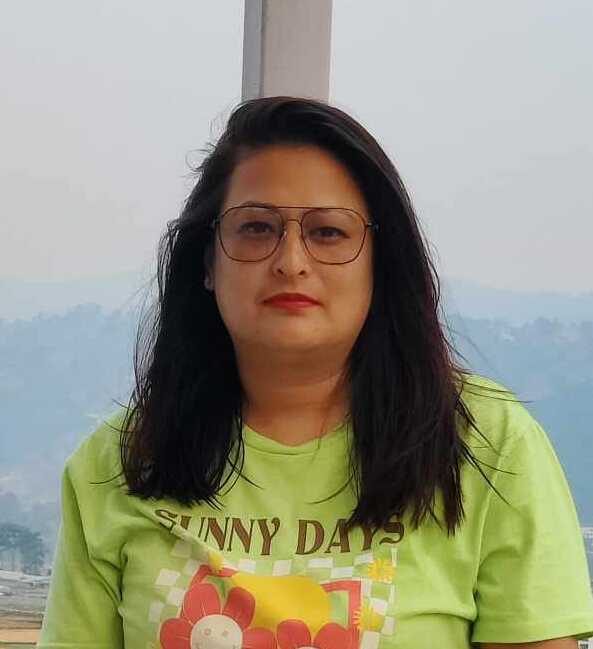
Samiksha Hada
Teacher Educator, KUSOED
Title of the Workshop: AI in Education
Samiksha Hada has been a faculty at Kathmandu University School of Education since 2023. She is serving as a Teacher Educator and handling various Digital and Innovation programs under CPEC. Ms. Hada is working with school teachers in integrating ICT and AI in their teaching and learning practices and empowering them in their professional development.
Contact Information
Contact: +977-9813700718: Aarogya Dahal,
+9779841360549: Samiksha Hada,
Or mail us at: cpep@kusoed.edu.np, aarogya.dahal@kusoed.edu.np, samiksha.hada@kusoed.edu.np
Conference Organising Committee: Kathmandu University School of Education, Continuing and Professional Education Center
Conference Theme: Transformative Learning in Action: Advancing Knowledge and Professionalism among Educators in Schools.
Venue: Nepal Administrative Staff College, Jawalakel, Lalitpur
EMCEE: Ms. Pooja Dangol and Chhabilal Devkota
Schedule for the Program
|
Time |
Session |
Details |
Responsible |
|
07:30-8:30 AM |
Registration and Breakfast |
Welcoming Participants and Kits Distribution |
Kabita Panthi & Purnima Thapa and Volunteers Kritika Pandey, Suchitra Devkota, Sujita Sharma |
|
08:30-09:25 AM |
Formal Program (Brihaspati Hall) |
Calling to Dias: Chairperson: Prof. Hem Raj Kafle, PhD, Associate Dean, KUSOED Chief Guest: Hon’ble Raghuji Pant, Minister for Education, Science, and Technology, Federal Government of Nepal; Pro-Chancellor, Kathmandu University Distinguished Guests: Hon’ble Bidhya Bhattarai Member of Parliament, Federal Government of Nepal Hon’ble Sumana Shrestha Member of Parliament, Federal Government of Nepal Prof. Dipak Aryal, PhD Vice Chancellor, Tribhuvan University Prof. Shilu Manandhar Bajracharya, PhD Vice Chancellor, Nepal Open University, Nepal Mahashram Sharma, PhD Chairperson, National Examination Board, Nepal Chiri Babu Maharjan Mayor, Lalitpur Metropolitan City Swastika Shrestha CEO, Teach for Nepal Krishna Prasad Adhikari President, PABSON KUSOED Official: Prof. Bal Chandra Luitel, PhD Dean, Kathmandu University School of Education National Anthem Inauguration: Hon’ble Raghuji Pant, lighting Panas Welcome Note: Sarita Khadka, Coordinator, Admission and Scholarship, KUSOED Cultural Dance: Down Syndrome Society Inaugural Remarks Hon’ble Raghuji Pant
|
Shila Thapa Rapporteur: Pratima Dallakoti and Sumitra Singh
Ms. Narayani Thakuri |
|
09:25-10:05 AM |
Keynote Speech (Brihaspati Hall) |
Title: Politics of Learning: Challenges of becoming a Teacher in dangerous times! |
Prof. Bal Chandra Luitel, PhD, Dean, KUSOED |
|
10:05-10:15 AM |
CPEC Highlights (Brihaspati Hall) |
Introduction and Ongoing Activities of CPEC. |
Sandip Dhungana, Coordinator, CPEC |
|
10:15-10:55 AM |
Keynote Speech (Brihaspati Hall) |
Title: "Who will stand with our Children? Hope and Truth of our students in Public Schools" |
Swastika Shrestha, CEO, Teach for Nepal |
|
10:55-11:05 AM |
Moving Break |
||
|
Paper Presentations 6 Parallel Sessions |
|||
|
11:05-12:35 PM |
Paper Presentation |
P1:Indu Gautam – Challenges of Parents Rearing an Autistic Child P2: Sangita Karki – Sensory Integration Therapy in Autism: Efficacy, Challenges, and Advances P3: Prerana Kharel – Challenges and Solutions of Autism and Down Syndrome in Schools P4: Sarita Khadka – Teachers' Lived Experience on Educating Children with Autism P5: Shamed Kumar Katila – Autism Awareness in School Teachers of Nepal P6: Padam Mahar – Teacher Professional Development in Inclusive Education in Nepal P7: Lal Bahadur Chaudhari – Foundational Learning Skills of Students with Disabilities |
Brihaspati Hall Moderator: Anita Gurung Rapporteur: Sita Shrestha |
| 11:05-12:35 PM |
Paper Presentation |
P1: Samira Dahal – STEAM in ECD: Integrating with Six Learning Areas P2: Meera Sharma (Dahal) – Fostering 21st Century Skills: STEAM in ECD P3: Durga Pandey – Promoting Teacher Professional Development on STEAM Education for Transformative Learning: A Participatory Action Research P4: Shruti Sharma – Integrating Local Materials and Play-Based Learning in Early Childhood Education for Holistic Child Development P5: Nirmala Timilsena – Digital Integration in Early Childhood Education and Development for Technology-enhanced Teaching and Learning Experience in Rural Nepal P6: Buddha Lama – NIMS Making Space Learning Journey P7: Anita Shahi – Value to Vision P8: Shreeya Shah Basnyat – Addressing Teachers’ and Parents’ Perception on Fostering an Inclusive School Environment |
Janaki Hall Moderator: Eleena Gurung Rapporteur: Laxman Luitel |
| 11:05-12:35 PM |
Paper Presentation |
P1: Rita Devi Acharya – Raising Awareness on Teachers’ Ethical Leadership via International Child Development Program (ICDP): A case of a Preschool, Nepal P2: Namrata Sharma – Practices of Action Research in Public Schools of Nepal P3: Jeevan Khati – Mindset to Market: Education for a Better Future P4: Noor Jung Shah – Child Protection and Professional Conduct P5: Hem Raj Gyawali – Title: ‘Ehipassiko’ Ethically: Enriching Ethics of Critical Ethnography of Classrooms through Buddhist Principles P6: Sudan Prasad Dotel – The Bhagavad Gita as a Guide for Teachers P7: Ramesh Baral – Do Our Schools Listen? Exploring Complaint-Response Mechanism of Community Schools. |
Pathibhara Hall Moderator: Shila Thapa Rapporteur: Shreya Dhungana |
| 11:05-12:35 PM |
Paper Presentation |
P1: Lokendra Karki – TPACK in Mathematics Education P2: Anirudra Aryal – Challenges and Opportunities of STEAM Education P3: Sabiha Sumbul – Perception of Kathmandu-based Undergraduate learners on technology integration in influencing English Speaking Proficiency P4: Roshani Rajbanshi – Innovative Pedagogy P5: Sandesh Basnet – Exploring the Use of ICT in the Teaching-Learning Process in Nepali Schools: A Narrative Inquiry P6: Lakpa Sherpa, PhD - Educational Practices in Private Schools of Nepal: Quality Education Analysis from the Perspective of Political Changes P7: Anita Paudel – Influence of Digital Technology in Modern Education Practices in Nepal |
Lumbini Hall Moderator: Jagat Shekar Dhakal Rapporteur: Hiralal Kapar |
| 11:05-12:35 PM |
Paper Presentation |
P1: Hikmat Dahal – Social Emotional Learning for Adolescents in Relation to School Counseling: A Humanistic Perspective Focusing on Self-Actualization and Personal Growth P2: Arjun Jung Rayamajhi – Learner's Learning Diversity: Through a Social Justice Lens P3: Sanjaya Adhikari – How Adolescent Students Develop Personal and Socio-cultural Values: A Narrative Review P4: Ramila Subedi – Unraveling Feminization of English Language Education in Leadership: Narratives from Nepal P5: Rajanee Maharjan – Child Story Book in Shaping Gender Perception P6: Chet Nath Panta, PhD – Cultivating a Culture of Psychological Wellbeing at School P7: Bandana Shrestha –Transformative Learning and Emotional Guidance: Addressing Young Adult Challenges in School. |
Manjushree Hall Moderator: Pabitra Rana Magar Rapporteur: Sahas Bhandari |
| 11:05-12:35 PM |
Paper Presentation |
P1: Tirtha Raj Ranabhat – Perception, Experience and Essence: As an Innocent Primary Level Student: An Autobiographical Narrative Inquiry P2: Pratiksha Chand Singh – Improving Students’ Engagement in Classroom through Action Research P3: Sabina Tamang – Improving Students’ Reading Comprehension by Question-Answer relationship strategy: A Classroom Action Research P4: Prem Kumari Thapa – A Journey of CATT Through Teachers’ Storytelling Competition P5: Indra Mani Dahal – Project-Based Teaching for Real Learning: A Narrative Inquiry on STEAM Learners P6: Bipin Sherchan –Khimi Dhim: A Sacred Place as a Thakali Indigenous Community of Nepal P7: Jileshan Saha – The Sound of Silence: Exploring the Emotional Wellbeing of women with disabilities at Khagendra Nabajiban Kendra, Jorpati |
Rara Hall Moderator: Anu Adhikari Rapporteur: Sujita Sharma |
| 11:05-12:35 PM |
Paper Presentation |
P1: Bhushan Dahal – Bridging Schools Communities: Examining the role of school management committees in Nepal P2: Sulochana Neupane – Seeds of Change: Participatory Action Research in Land-based learning P3: Sawana Bhatta – Significance of Positive Parenting on Safeguarding Children from Abuse and Violence P4: Somnath Mishra – Role of Self-Esteem on Career Determination of Grade Twelve Students: A Narrative Inquiry P5: Mahendra Thapa – Connecting Social and Emotional Learning with Academic Engagement P6: Pranisha Basnet – Inclusive Education Practices at Heimric National School P7: Babu Ram Gole - Edu-Tech-ing Tomorrow: An Action Research P8: Rekha Rana |
Swayambhu Hall Moderator: Bishwash Dhakal Rapporter: Chhabilal Devkota |
|
12:35-1:35 PM |
Lunch Break |
||
|
01:35-03:05 PM |
Parallel Workshops on different themes |
||
|
Workshop (Janaki Hall): Land/place-based pedagogy for social justice Co-facilitator: Eleena Gurung |
Assoc. Prof. Prem Phyak, PhD, Teachers College, Columbia University |
||
|
Workshop (Pathibhara Hall): Pedagogical Approaches in Early Pedagogy and Childhood Development Co-facilitator: Shila Thapa |
Meenakshi Dahal, PhD, Visiting Faculty, KUSOED |
||
|
Workshop (Lumbini Hall): Transformative Leadership Co-facilitator: Jagat Shekhar Dhakal |
Medin Lamichhane, Visiting Faculty, KUSOED |
||
|
Workshop (Manjushree Hall): Education for Development Co-facilitator: Binita Koirala |
Amrit Thapa, PhD, Senior Lecturer, University of Pennsylvania and Ranjita Dhital, PhD, Lecturer, University College London |
||
|
Workshop (Rara Hall): Assessment Practice in School Education Co-facilitator: Anita Gurung |
D.R. Simkhada, Visiting Faculty, KUSOED |
||
|
Workshop (Swayambhu Hall): AI in Education Co-facilitator: Bishwash Dhakal |
Samiksha Hada, Faculty, KUSOED |
||
|
03:05-03:30 PM |
Plenary Session Topic: Resetting how Politicians talk about Education and Teachers |
|
|
|
03:30 -05:00 PM |
Panel Discussion (Brihaspati Hall) Moderator: Mahendra Thapa, PhD Rapporteurs: Pratima Dallakoti and Sumitra Singh |
Hon’ble Bidhya Bhattarai, Member of Parliament, Federal Government of Nepal Prof. Bal Chandra Luitel, PhD, Dean, KUSOED Mahashram Sharma, PhD , Chairperson, National Examination Board Krishna Prasad Adhikari, President, PABSON |
|
|
05:00-05:10 PM |
Closing Ceremony (Brihaspati Hall)
|
Prof. Bal Chandra Luitel, PhD, Dean, KUSOED Madan Rijal, Lecturer, KUSOED Prof. Hem Raj Kafle, PhD, Associate Dean, KUSOED |
|
|
05:10 onwards |
Tea, Refreshments, and Networking |
||